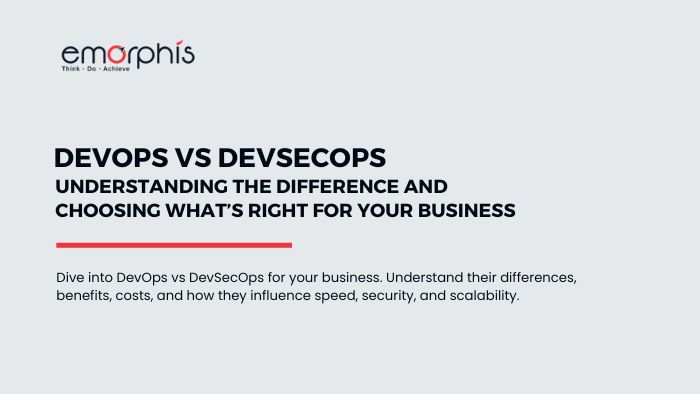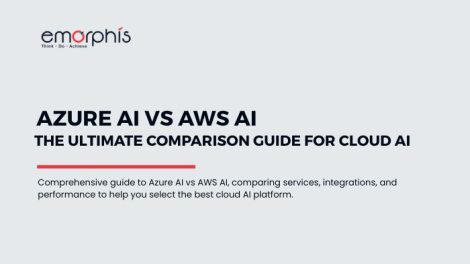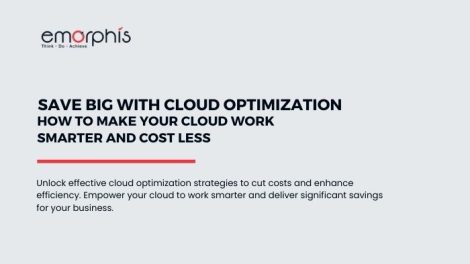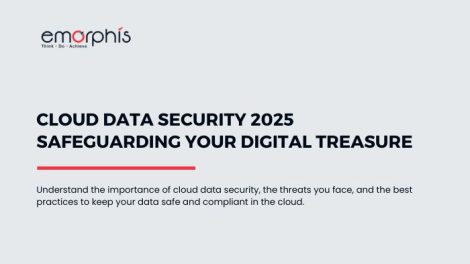In the ever-evolving world of software development, businesses are under constant pressure to deliver faster, better, and more secure applications. Two methodologies that have risen to prominence to meet these demands are DevOps and DevSecOps. While both aim to improve software delivery, their approaches differ significantly. In fact, the debate of DevOps vs DevSecOps has become crucial for organizations striving to align their development strategies with business goals.

In this comprehensive guide, we’ll explore the key differences between DevOps and DevSecOps, their respective benefits, and the costs involved. Furthermore, how to decide which methodology is the best fit for your organization.
What is DevOps?
DevOps is a cultural and technical movement that bridges the gap between software development (Dev) and IT operations (Ops). Moreover, it focuses on collaboration, automation, and continuous improvement to streamline the software delivery process. The primary goal of DevOps is to create a seamless workflow from development to production, moreover, ensuring faster delivery and higher-quality software.
Core Principles of DevOps
- Collaboration: Encourages cross-functional teams to work together cohesively.
- Automation: Implements tools for continuous integration and continuous delivery (CI/CD).
- Monitoring: Emphasizes performance tracking and system reliability.
- Feedback Loops: Shortens feedback cycles for quick iteration and improvement.
Why DevOps is Important for Businesses
DevOps enhances operational efficiency, moreover, allowing businesses to deploy updates and new features rapidly. Moreover, it reduces downtime and ensures higher customer satisfaction.
Key Benefits of DevOps
- Faster Delivery: Automated pipelines allow quick rollouts.
- Improved Quality: Continuous testing catches bugs early.
- Cost Savings: Automation reduces manual efforts and operational overhead.
- Better Collaboration: Teams operate in sync, fostering innovation.

What is DevSecOps?
DevSecOps extends the principles of DevOps by integrating security practices into every stage of the software development lifecycle (SDLC). In fact, it emphasizes the philosophy of “shifting security left,” meaning vulnerabilities are identified and addressed early in the development process.
Core Principles of DevSecOps
- Security as Code: Embeds security directly into the CI/CD pipelines.
- Automation of Security: Uses tools to identify and fix vulnerabilities automatically.
- Proactive Risk Management: Focuses on preventing risks rather than reacting to them.
- Continuous Monitoring: Ensures systems remain secure after deployment.
Why DevSecOps is Important for Businesses
As cyber threats increase in sophistication, businesses cannot afford to treat security as an afterthought. DevSecOps ensures that applications are not only efficient but also secure, building customer trust and protecting sensitive data.
Key Benefits of DevSecOps
- Enhanced Security: Proactively addresses vulnerabilities.
- Compliance Adherence: Meets regulatory standards such as GDPR and HIPAA.
- Reduced Costs: Mitigate the high costs of data breaches and legal penalties.
- Customer Confidence: Builds trust in your brand’s commitment to security.

DevOps vs DevSecOps: The Key Differences
The distinction between DevOps vs DevSecOps lies in their focus and implementation. While DevOps prioritizes speed and collaboration, DevSecOps integrates security into every stage of development.
| Aspect | DevOps | DevSecOps |
|---|---|---|
| Primary Focus | Speed, collaboration, and efficiency. | Security is a core element of development. |
| Security | Added at the end of the SDLC. | Embedded throughout the SDLC. |
| Cost | Lower upfront costs; risks of security lapses. | Higher initial costs; reduced long-term risks. |
| Team Structure | Collaboration between Dev and Ops teams. | Collaboration between Dev, Ops, and Security. |
| Best For | Businesses focusing on rapid innovation. | Industries handling sensitive data (e.g., finance, healthcare). |
Why Are DevOps and DevSecOps Important Today?
In today’s competitive and security-conscious market, both DevOps and DevSecOps play pivotal roles.
Importance of DevOps
- Meeting Market Demands: In today’s fast-paced digital landscape, customers increasingly expect quick updates and feature rollouts. In fact, DevOps ensures these demands are met seamlessly without compromising on quality.
- Efficiency at Scale: Furthermore, automation plays a pivotal role in minimizing errors, reducing bottlenecks, and significantly improving team productivity.
- Fostering Innovation: Moreover, with streamlined processes in place, teams can dedicate more time to creative problem-solving and drive innovation effectively.
Importance of DevSecOps
- Addressing Cyber Threats: As cyberattacks continue to rise, it is more critical than ever to integrate security into the development process proactively.
- Regulatory Compliance: Additionally, industries such as healthcare, finance, and e-commerce must meet stringent regulatory requirements, which DevSecOps effectively addresses.
- Customer Trust: Moreover, secure applications not only protect sensitive data but also enhance user confidence, ultimately reducing churn rates and fostering loyalty.
How Much Does It Cost?
Costs Involved in DevOps
- Tooling Expenses: To begin with, implementing tools for CI/CD, monitoring, and infrastructure automation, such as Jenkins and Kubernetes, incurs upfront costs.
- Cloud Costs: Additionally, hosting and managing cloud infrastructure to ensure scalability adds to the overall investment.
- Team Training: Furthermore, upskilling developers and operators to effectively adopt DevOps practices is essential, requiring both time and resources.
Costs Involved in DevSecOps
- Security Tools: First and foremost, implementing advanced tools for vulnerability scanning, threat detection, and compliance checks, such as Snyk and SonarQube, involves significant investment.
- Compliance Investments: Additionally, achieving and maintaining regulatory compliance adds to the overall costs, especially for industries with strict standards.
- Higher Training Costs: Moreover, teams require specialized training in security practices, which increases both upfront expenses and the time needed for adoption.
Although DevSecOps has higher initial costs, it provides long-term savings by preventing costly breaches and compliance violations.
Which One Should You Choose?
The choice between DevOps vs DevSecOps depends on your business needs, industry, and objectives.
When to Choose DevOps
- If your business prioritizes speed and agility.
- Also, if your industry does not require stringent security measures.
- If you are just beginning your digital transformation journey and need a cost-effective solution.
When to Choose DevSecOps
- If you handle sensitive customer data or operate in highly regulated industries.
- Also, security breaches could significantly impact your reputation and finances.
- If you aim to establish a secure, scalable, and future-proof software development environment.
Can You Use Both?
Yes, many businesses adopt a hybrid approach, starting with DevOps and gradually integrating DevSecOps principles. In fact, combining the speed of DevOps with the security of DevSecOps can offer the best of both worlds. This approach ensures fast delivery without compromising security.
Final Thoughts
The debate between DevOps vs DevSecOps is not about which methodology is superior but about which one aligns better with your business objectives. While DevOps accelerates software delivery, DevSecOps ensures that this speed does not come at the cost of security.
Also, as cyber threats continue to rise and customer expectations grow, businesses cannot afford to overlook either methodology. By carefully evaluating your goals, resources, and industry requirements, you can implement the right approach—or a combination of both—to drive efficiency, security, and growth.
In conclusion, whether you choose DevOps, DevSecOps, or a blend of the two, the key lies in fostering a culture of collaboration, innovation, and continuous improvement. After all, delivering secure, high-quality applications quickly is no longer a luxury—it’s a necessity for thriving in today’s digital landscape.







